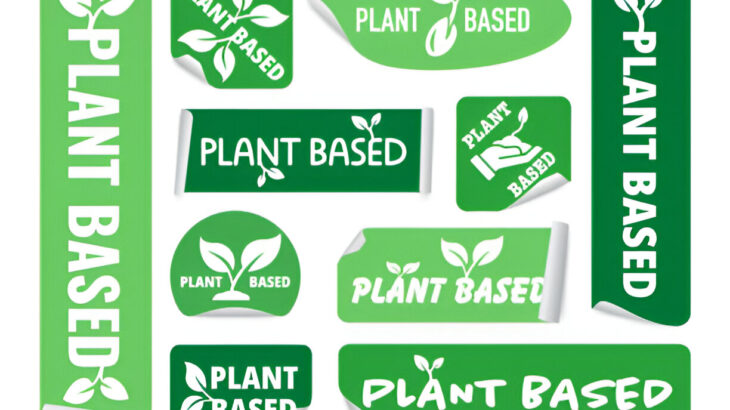Have you noticed Rise of Plant-Based Labels on food packaging? As more people choose plant-based diets, companies are adding these labels to help shoppers know which products are vegan-friendly. But with so many new products and labels, it can be confusing. What do these labels mean, and how can you be sure you’re choosing the right products? Let’s dive into what “plant-based” labels are, why they’re important, and what to look for when buying vegan products.
What Does “Plant-Based” Mean?
A plant-based label usually means that the product is made from plants and does not contain animal ingredients. This includes fruits, vegetables, grains, nuts, and seeds. However, not all plant-based products are strictly vegan. For example, some plant-based foods may still contain small amounts of dairy or other animal ingredients, so it’s always a good idea to read the full ingredient list.
The term “plant-based” can also be a little broader than “vegan.” While vegan means completely free of animal products (like meat, milk, eggs, and honey), plant-based focuses more on the primary ingredients being plants but doesn’t guarantee the absence of all animal products. Some people prefer plant-based diets for health reasons, while others choose vegan for ethical reasons. Knowing this difference helps you decide which products fit your lifestyle best.
Why Are Plant-Based Labels Becoming Popular?
The popularity of plant-based foods is growing for a few reasons:
- Health Benefits: Many people believe that plant-based diets can reduce health risks like heart disease, diabetes, and certain cancers. Plant-based foods are often high in fiber, vitamins, and minerals.
- Environmental Concerns: Producing plant-based foods has a lower environmental impact compared to animal farming, which uses more land and water and produces more greenhouse gases.
- Animal Welfare: Choosing plant-based foods means supporting a system that avoids harming animals. This aligns with the values of people who care about animal welfare.
With these benefits in mind, more people are looking for plant-based options, and companies are responding by adding more products and labels to their shelves.
What to Look for in Plant-Based and Vegan Labels
With so many new products on the market, here are some things to check for when you see a plant-based or vegan label:
- Look for Certified Vegan Labels
The Certified Vegan label is one of the most reliable ways to know that a product is 100% vegan. This label is usually managed by organizations like Vegan Action, which makes sure the product is free from animal ingredients and has not been tested on animals. - Check for Plant-Based Protein Sources
Protein is an important nutrient, and some vegan products are designed to provide it in ways similar to meat. Common plant-based proteins include soy, pea protein, lentils, chickpeas, and quinoa. If you’re looking for protein-rich options, check the label to see if the product includes these ingredients. - Avoid Hidden Animal Ingredients
Some products may appear plant-based but still contain small amounts of animal-derived ingredients. Common ones to look out for include:- Gelatin: Made from animal bones and used in candies, marshmallows, and some yogurts.
- Casein and Whey: Proteins from milk, often found in processed foods.
- Lard or Suet: Animal fats sometimes used in baked goods.
Reading the ingredients list is a good way to make sure there are no hidden animal products.
- Check for Non-GMO and Organic Labels
Many vegan shoppers also look for Non-GMO and organic labels. Non-GMO means the product does not contain genetically modified organisms, while organic means it was grown without synthetic pesticides or fertilizers. These labels can be especially important if you want food that’s both healthy and grown sustainably. - Beware of Highly Processed Ingredients
Some plant-based products can still be high in salt, sugar, or artificial additives. Highly processed foods might not be as healthy, even if they are plant-based. Look for products with natural ingredients you recognize, like whole grains, nuts, seeds, and vegetables. - Sustainable Packaging
Another aspect to consider is the packaging. Some brands with plant-based products also use environmentally friendly packaging to reduce waste. This can include recyclable or compostable packaging materials, which help reduce the product’s environmental impact even further.
Tips for Shopping for Vegan Products
Here are some simple tips to keep in mind next time you’re shopping for plant-based or vegan foods:
- Read the Full Ingredient List: Sometimes, animal ingredients are hidden in small print. Checking the ingredients can help you avoid any surprises.
- Start with Trusted Brands: If you find a brand you like and trust, you’ll feel more confident buying its products. Many brands that focus on plant-based foods are committed to transparency and quality.
- Check Online Resources and Reviews: Many vegan and plant-based brands have websites that explain their products in detail. Online reviews and vegan communities can also offer advice on which products are popular and meet high standards.
Why Plant-Based Labels Matter
Plant-based labels help shoppers make choices that align with their values. Whether you’re eating plant-based for health, the environment, or ethical reasons, labels make it easier to find foods that match what you care about. With more people interested in plant-based diets, these labels have become essential guides for those seeking vegan-friendly products.
Final Thoughts
As plant-based foods become more popular, knowing what to look for in labels is key. A certified vegan label, high-quality plant-based proteins, clear ingredient lists, and responsible packaging are all signs of good vegan products. By understanding these labels, you can feel confident in choosing foods that are not only good for you but also kind to animals and the planet.
So next time you’re in the grocery store, keep an eye out for plant-based and vegan labels. Making informed choices lets you enjoy delicious, healthy foods while supporting a kinder, more sustainable world.
